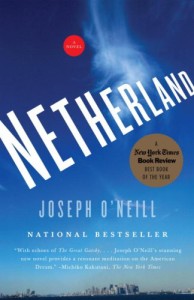Cricket is Foreign to New York
 O’Neill, Joseph (2008). Netherland. New York: Vintage
O’Neill, Joseph (2008). Netherland. New York: Vintage
It’s possible to compare this novel to The Great Gatsby. The first person, highly reflective and articulate narrator, Hans, describes the ambitious economic and social climbing and pretensions of a newcomer to town (New York being the town), a Trinidadian named Chuck. Like Gatsby, Chuck has a secret, revealed at the end. Chuck’s first and futile love, his Daisy Miller equivalent, is the sport of cricket, which he would like to introduce into America, certain it would catch on.
While The Great Gatsby is a compelling story, Netherland is the kind of book where you skim, looking for some gem of fine writing, and there are plenty of those. Perhaps it’s all the cricket talk that gets in the way. One can appreciate that cricket is a passionately loved sport in the old Empire, but Americans don’t give two hoots. And the lyrical gems of writing are not found in the lengthy descriptions and dialogs about cricket, so: lots of skimming.
O’Neill changes scenery frequently, and tries to manufacture episodes with dramatic suspense, but these don’t offset the fact that there is no overall story arc. Hans and his wife separate, try to get back together, fail, try again and succeed. Chuck wants to build a major cricket arena in New York, but that seems delusional. Hans doesn’t know what he wants. He is the main character, unlike Nick Carraway, but he remains lackadaisical throughout. Originally from Holland, he was a foreigner in London and is a foreigner in New York.
After his wife leaves him and returns to London (because she was creeped out by the 9/11 attacks), Chuck befriends Hans rather forcibly, insisting that they play cricket with other immigrants, many from India and Pakistan, and the friendship develops awkwardly within this immigrant community. Chuck is a roughneck who runs a diner, while Hans is a Wall Street analyst, but the garrulous Chuck is avuncular and directive with Hans, who passively tolerates his home-spun philosophizing and grandiose plans. Chuck is a strong and interesting character.
In the end, Hans goes back to London, eventually reconciling with his wife, and there he learns that Chuck has died. The novel opens with Hans in London receiving a phone call from someone telling him Chuck is dead, then the rest of the book is a reminiscence. It’s an annoying narrative structure, chosen, no doubt, merely so the story could open on a rare, (pseudo-) dramatic note.
But quibbles aside, there’s some fine writing and keen observation that make the novel worth reading.
“…While I changed, Danielle wandered around my apartment, as was her privilege: people in New York are authorized by convention to snoop around and mentally measure and pass comment on any real estate they’re invited to step into. In addition to the generous ceiling heights and the wood floors and the built-in closets, she undoubtedly took in the family photographs and the bachelor disarray…Like an old door, every man past a certain age comes with historical warps and creaks of one kind or another, and woman who swishes to put him to serious further use must expect to do a certain amount of sanding and planning” (108-109).
In London, it must be recognized, escape – to the country, to warmer climes, to the pub – is a great, bittersweet theme. Sometimes this results in a discussion of New York City, in which case I’m quite happy to listen to somebody report excitedly on the Chrysler building or the jazz riches of the Village…Although it’s not a secret that I lived for some time in the city in question, I’m not accorded any unusual authority. This isn’t because I’ve been back for a while, but, rather, because I’m precluded by nationality from commenting on any place other than Holland…as a foreign person I’m essentially of some mildly buffoonish interest to the English…” (180-181).
